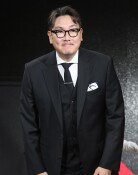Process of arms purchase new focus of concern
Process of arms purchase new focus of concern
Posted February. 20, 2001 17:21,
U.S. pressure on Korea to purchase its weapons has once more emerged as a bone of contention following reports that Secretary of State Colin Power plugged Boeing F-15 fighters during his Feb. 7 meeting with Foreign Affairs-Trade Minister Lee Joung-Binn in Washington.
Some government and industry watchers say that the Republican administration`s close ties with military arms suppliers is spawning fears the U.S plans to openly pressure its allies, including Korea, to buy American-made weapons. Arms acquisition projects involve very complicated and delicate problems that encompass not only economic and technological elements but also the political situation. Therefore, decisions on purchases tend to heavily depend on diplomatic and political negotiations. Following is a look at how the U.S goes about pushing weapons sales and how the Korean government deals with American pressure.
Korea represents biggest arms market:
As for the Bush administration’s perceived pressure on Korea to buy U.S. weapons, officials of the Ministry of Defense said it was nothing new. They said that the fate of U.S. arms makers depends on exports and that the U.S. has long enjoyed a virtual monopoly on the Korean weapons market thanks to its military alliance with Korea.
Seoul is this year scheduled to conclude a multi-trillion won project to acquire next-generation fighters (FX), attack helicopters (AHX) and air-to-air missiles (SAMX) as part of efforts to boost its war capability. Therefore, Seoul cannot help but be an arena of fierce lobbying among major weapons exporters such as the U.S., Russia and France.
U.S. pressure on Korea to buy its F-15 fighters, one of top candidates in the FX project, dates back as far as 1999. Then Defense Secretary William Cohen openly asked Korea to buy the U.S. military aircraft during the annual Korea-U.S. Security Consultative Meeting in Washington in October 1999, saying, "Inter operability is important in joint operations.’’
On Jan. 29, Jerry Daniels, president of Boeing`s defense aircraft arm, visited top leaders of the armed forces, Army Chief of Staff Gen. Kil Hyung-Bo, Chief of Naval Operations Adm. Lee Soo-Yong and Chief of Air Force Gen. Lee Eok-Su at Kyeryongdae. His meeting with top military leaders was a clear sign of America`s close ties with the Korean armed forces.
Is postponement of aquisition decisions a problem?:
The Ministry of Defense announced on Nov. 23 last year that 214 German-made submarines were chosen for the next-generation submarine project (KSS2). The ministry made the selection much earlier, but had put off the announcement in consideration of diplomatic relations with France. French President Jacques Chirac had strongly urged Korea to purchase French submarines during the ASEM (Asia-Europe Meeting) in Seoul on Oct. 20-22, according to government sources.
The consensus these days is that Korea`s efforts to boost its war capability, including the FX project, will become the "largest hidden issue’’ at the Korea-U.S. summit early next month.
Consequently, the government is clearly in a very delicate position as it strives to establish a new framework for Korea-U.S. relations and works to coordinate its North Korea policy with that of Washington.
The government is considering postponing until the end of 2001 the selection of the FX contract winner, slated for July, and the winning bidder in the AHX project, due in September, and shelving the SAMX project for the time being. The government seems to be hoping that bidders will lower their prices and that Seoul-Washington negotiations on dealing with North Korea will give it an advantage in weapons acquisition projects.
A government official said, "The large-scale project to import weapons is the sole tool at our disposal.’’







